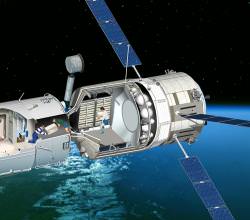There’s an interesting story posted to the Christian Science Monitor today entitled, Does Space Need Air Traffic Control?. It’s a good question. Are there just too many spacecraft, satellites and space telescopes buzzing around the Earth at this point that collisions will be inevitable without some kind of system to manage them all?
The article describes the pileup of spacecraft currently at the International Space Station. Think about it. Endeavour just arrived for STS-123 and Europe’s new cargo ship will show up on April 3rd. There’s already a Progress supply ship docked to the station, and a Soyuz will be arriving on April 10th for a crew swap. And next year, the Japanese will be adding their automated resupply ship there as well.
With this kind of traffic to and from the station, people are starting to call for some way to regulate it. Some are hoping there’ll be an international body, like the International Civil Aviation Organization, and others think that nation-to-nation agreements will do the trick.
There’s a building consensus that space debris is becoming a real threat to future space launches. The more material up there, the better chance it could collide with future spacecraft and stations. And there’s a worry that the density of space debris could reach some dangerous point where it collides and re-collides until a band of space becomes a shrieking hail of tiny particles moving at high velocity. No spacecraft could withstand passing through that region without being torn to shreds.
You might be surprised to know that there’s currently no cooperation between nations. Last year, China fired an anti-satellite missile at dead communications satellite, and blew it into high velocity shrapnel. Other nations will now have to keep track of this belt of debris for more than a century until its orbit finally decays and it burns up.
Countries don’t inform one another when they launch spacecraft, when they change orbits, or even when they crash them back down into the Earth’s atmosphere (hopefully to burn up).
What would it take to get international cooperation to ensure that the trip up to orbit is as safe from debris as possible? Anyway, check out the article and discuss.
Original Source: Christian Science Monitor


I think space traffic control is very much necessary .Because few days back i was watching television and i saw that one American satellite was out of control , which was very much dangerous as it could collide earth.
An enterprising, private concern could make a lot of money from countries having space junk in orbit by launching and reclaiming dead satelites, broke pieces and such. Charge each acording to what and where. If a country refused to pay see that the particular piece unpayed for falls into the country refusing the fee. Now, if someone will step up and get the private sector into space and working…
Consider SpaceNet 2.0; the Supply Chain software of the 21st century will inevitably become the repository for all movement of interplanetary supplies. This software system will demand to understand the movements of space debris/junk so that it can be avoided between delivery routes.
I think a space traffic control centre is very much neccesary especially in the coming years. We will be launching more and more sattelites, more counntries are starting space agencies and companies like virgin galactic(comercial space travel) are setting up.
If you could capture some of that space debris… and recycle it.
If we’re gonna send tourists to space we will need some kind of “space traffic control”… I wouldn’t want to go without it.
Dont you think at least the halo of pulverized satellites would be pretty at sunset? It would pretty much end the buildup of arms in space. Just another step we have to go through before joining the rest of the galactic empire. Remeber, all civilazations probably went through the exact same problems… that is IF we are not alone.
Otherwise, we would have 1000 years or so before the “cloud” thinned out. Imagine the progress we probably would have made in that time. It will be all right whichever happens.
ATC in space(LOL)? I don’t think we need ATC in low earth orbit yet.
I believe the NASA, ESA, JAXA and CSNA do know when they will be lifting off and the route/orbit each mission will have. And what has to do space debris with ATC? it’s not like ATC know the location and position really!
When you will have 2-4 daily flights to from space maybe you will need ATC until then an comm link between space operators is all you need.
As for the private operators are not an issue at all. First of all they won’t be taking off (I mean most companies will bankrupt) Those who survive will mostly fly low suborbital vehicles no debris or space probe exists there due to the friction existing. For that kind of operation the ordinary (atmospheric) ATC is all you need.
With the enormous difficulty involved in getting material into space in the first place it seems silly to simply let this stuff crash back into the earth and be destroyed.
Is there no way to collect this junk into a single artificial satellite, that has the potential to be reused? If a sizable magnetic net of some kind were deployed to collect this stuff we might be able to implement some of the parts in later space missions saving us cargo room on ships headed into space.
It might even be worth while to devise some means of sending this material to the Moon near where we might set up a lunar research station, it would be a triumph of humanity if our first lunar outpost was a recycling center.
Can we vaporise the smaller bits with a ground or spacecraft-based laser? Because that would be really cool.
Thanks for the Info